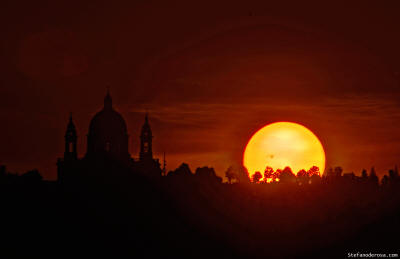|
May 10, 2012 from SpaceWeather Website
Huge sunspot AR1476 is crackling with M-class solar flares and appears to be on the verge of producing something even stronger.
The sunspot's 'beta-gamma-delta' magnetic
field harbors energy for X-class flares, the most powerful kind.
Earth is entering the line of fire as the sunspot rotates across the
face of the sun.
NASA's
Solar Dynamics Observatory
recorded the extreme ultraviolet flash:
Apparently, the almost-X class explosion
did not hurl a significant CME toward Earth. NOAA forecasters
estimate a 65% chance of more M-class flares and a 10% chance of
X-flares during the next 24 hours.
On May 9th, amateur astronomer
Thomas
Ashcraft of New Mexico detected strong shortwave radio bursts coming
from the sunspot. Click below controls to hear the "solar static" that roared out
of his loudspeaker:
Dynamic spectrum courtesy of Wes Greenman, Alachua Radio Observatory
Solar radio bursts are caused by plasma
instabilities that ripple through the sun's atmosphere in the
aftermath of powerful flares. With AR1476 poised for more eruptions,
this 'radio activity' is likely to continue for days.
Sunspot AR1476 is so large, people are noticing it without the aide of a solar telescope. The behemoth appears at sunrise and sunset when the light of the low-hanging sun is occasionally dimmed to human visibility.
Stefano De Rosa sends this
picture from Turin, Italy: Photo details:
Canon Eos 5D Mark II; Focal length:700mm; Exp: 1/8000
sec; F/40; ISO:50
The sunspot looks a lot like Hawaii, but it is much bigger than any island on Earth. From end to end the sprawling active region stretches ~160,000 km, or a dozen times wider than our entire planet.
|

